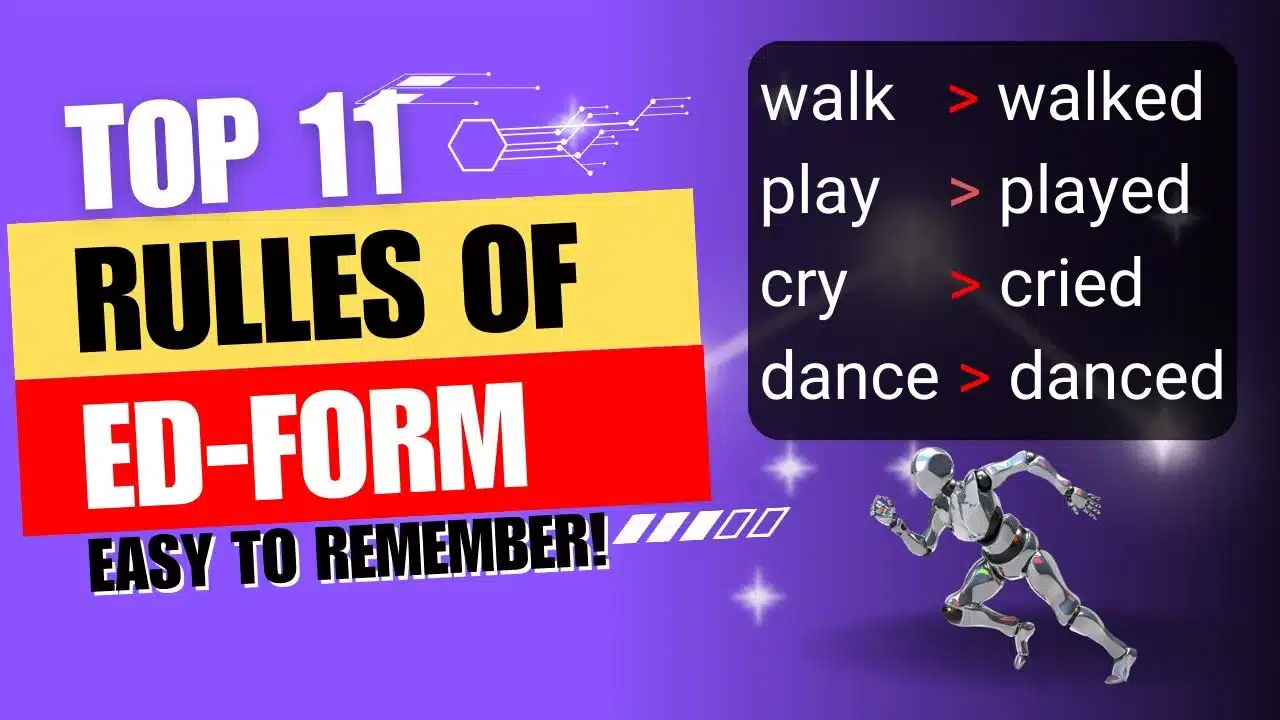In English grammar, the past participle form of a verb is referred to as the “-ed form.” It is also known as the perfect participle or third-verb form. The past participle is used to construct the perfect tenses (present perfect, past perfect, and future perfect), as well as the passive voice. It can also be used as an adjective.
In English, there are two sorts of verbs: regular verbs and irregular verbs. The past participle of a regular verb is formed by adding –ed to the base form of the verb. For example, the past participle of the verb “walk” is “walked”.
These forms are for Regular Verbs only. For Irregular Verbs, we have no idea how to add “ed“; we only learn them by heart or recite them. I’ll post them later. And I will post a link for you after I write them. So, don’t worry. Let’s get started with the “ed form” of Regular Verbs for now.
The Spelling Rules of “ED” of Verbs
Table of Contents
Rule 1
We generally add “ed” to the end of a verb when we want to make the past simple.
Look > looked
Talk > talked
Watch > watched
Finish > finished
Rule 2
When a verb ends in “e”, we add only “d”.
Bake > baked
Smile > smiled
Like > liked
Save > saved
Rule 3
When a verb ends in “ee”, we also add only “d”.
Agree > agreed
Free > freed
Disagree > disagreed
Rule 4
When a verb ends in a vowel plus “w or x”, we add “ed”.
Relax > relaxed
Fix > fixed
Show > showed
Review > reviewed
Rule 5
When a verb ends in a consonant plus “-y”, we need to change “y” to “i ” and add “ed”.
Try > tried
Cry > cried
Study > studied
Marry > married
Rule 6
When a verb ends in a vowel plus “-y”, we don’t change it, we add only “ed”.
Enjoy > enjoyed
Stay > stayed
play > played
destroy > destroyed
Rule 7
When one-syllable verbs end in a vowel and a consonant, we need to double the final consonant before adding “ed”.
Stop > stopped
Plan > planned
Dub > dubbed
Crop > cropped
Rule 8
When two or more syllable verbs end in a vowel and a consonant, we need to double the final consonant if the last syllable is stressed.
Admit > admitted
Commit > committed
Refer > referred
Prefer > preferred
Rule 9
When two or more syllable verbs end in a vowel and a consonant, we don’t need to double the final consonant if the last syllable isn’t stressed.
Target > targeted
Visit > visited
Happen > happened
Open > opened
Listen > listened
Rule 10
When a verb ending in “c”, we need to add “-k” before adding “ed”.
Picnic > picnicked
Mimic > mimicked
Traffic > trafficked
Rule 11
When a verb ends in a vowel plus “-L’’ then we need to double the final “L’’ before adding “ed” in British English.
Equal > equalled
Travel > travelled
Control > controlled
Special Note About American English Rule
But in American English, we don’t need to double the final “L” if the last syllable isn’t stressed, and we need to double it if the last syllable isn’t stressed.
Equal > equaled
Travel > traveled
Control > controlled
Distil > distilled
Note: If you think that there is some missing info or anything wrong, do not hesitate to comment below in the comment section. We also feel happy to correct it.


Hi this is kinda of off topic but I was wanting to know if blogs use WYSIWYG editors or if you have to manually code with HTML. I’m starting a blog soon but have no coding know-how so I wanted to get advice from someone with experience. Any help would be enormously appreciated!
Michelle Benecke- Harvarrd Law
340 Dirksen Senate Office Building
Washington D.C, 20510
202-224-2627
michelle benecke